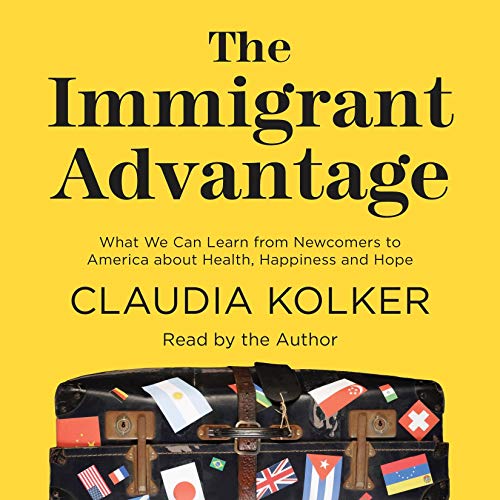You have /5 articles left.
Sign up for a free account or log in.
 The Immigrant Advantage: What We Can Learn from Newcomers to America about Health, Happiness and Hope by Claudia Kolker
The Immigrant Advantage: What We Can Learn from Newcomers to America about Health, Happiness and Hope by Claudia Kolker
First published in September 2013
Audiobook published in November 2019
A cognitive defect that I suffer from, but which I don’t think has been named yet, is a bias toward reading only newly published books.
This bias is amplified by the economics of digital goods and the scary monopoly power of Amazon in digital books.
For most of my life, hardcover books were unaffordable luxuries, like flying business class. Nowadays, I still fly coach -- but I buy only newly released books.
The cost of a digital book is about that of a softcover volume. Actually, that is not true -- as I tend to buy both the ebook (Kindle) and the audiobook (Audible) from Amazon. The price of integrated (Whispersync) e/audiobooks is about that of a hardcover.
This description of my book-buying habits is offered as an explanation as to why the last book I read was first published in 2013.
The Immigrant Advantage may be six years old, but it is hard to think of a more timely book for our higher ed community to discuss.
I only read the book because Audible belatedly released the audiobook version last month. If The Immigrant Advantage had not popped up as a new release at Audible.com, I would have missed it. And that would have been a shame.
The other day I was having a conversation with a colleague who runs a graduate program. She mentioned that she is seeing a decline of international applicants, which she attributes to our current “anti-immigrant” politics.
Higher education remains one of our country's most important exports. While the numbers are trending down in the last couple of years, it is still true that U.S. colleges and universities host more than 1.1 million international students.
At many institutions, the economic model of the university relies on attracting international students. These students tend to have their tuitions discounted at a lower rate than native-born students.
With our students, and our professors and staff, U.S. colleges and universities experience the immigrant advantage on a daily basis.
The Immigrant Advantage, however, is not about international students. This is not a book about the already well-documented economic benefits of immigrants. Instead, The Immigrant Advantage is a book about the cultural practices that people bring with them to the U.S. from their places of birth.
The argument that Kolker makes in this beautifully written and deeply researched book is that immigrants not only enrich our communities and our economy, but that those who are lucky enough to have been born in the U.S. can learn much from those who choose to live here.
Kolker explores several practices of immigrant groups, from the cuarentena of Mexican immigrants to Vietnamese money clubs to Korean after-school study programs.
The cuarentena is the practice of supporting new moms for 40 days after they give birth. The commitment of the relatives of new mothers to absorb domestic duties for over a month after delivery appears to be highly protective against postpartum depression. Money clubs enable immigrants without much capital or collateral to start small businesses. And after-school study programs are inexpensive compared to private schools, but confer many of the same advantages in college admissions.
The Immigrant Advantage also covers why a poor community in Chicago has lower asthma rates than one would expect, given the demographic profile of the residents. And how West Indian immigrants achieve high rates of homeownership and education through a willingness to create intergenerational households.
There is a book waiting to be written on what we can all learn from the study practices of international students and the teaching practices of international professors.
Has our higher ed community done enough to stand up against anti-immigrant rhetoric?
Are we actively and vocally celebrating the contributions of immigrants on our campuses?
What books would you recommend on immigration?
What are you reading?








